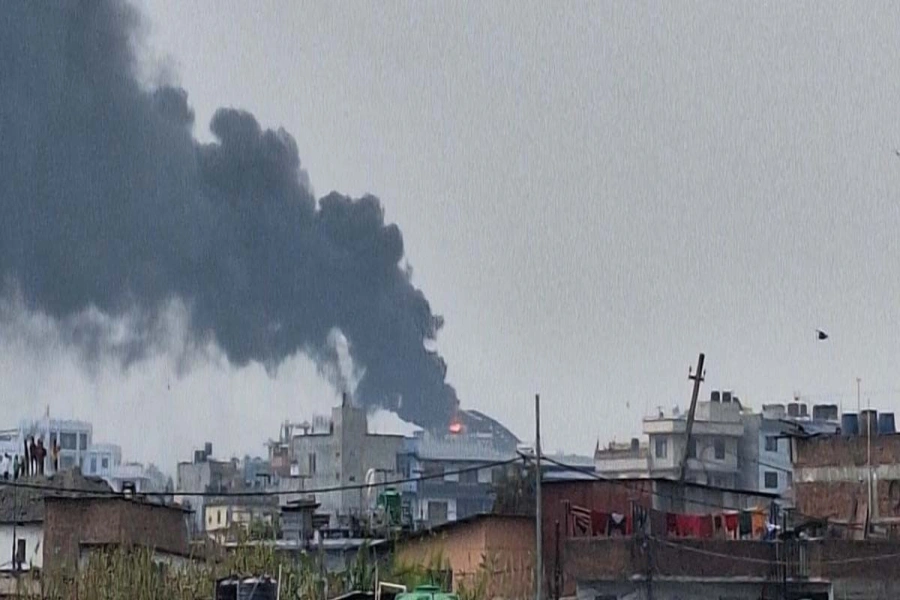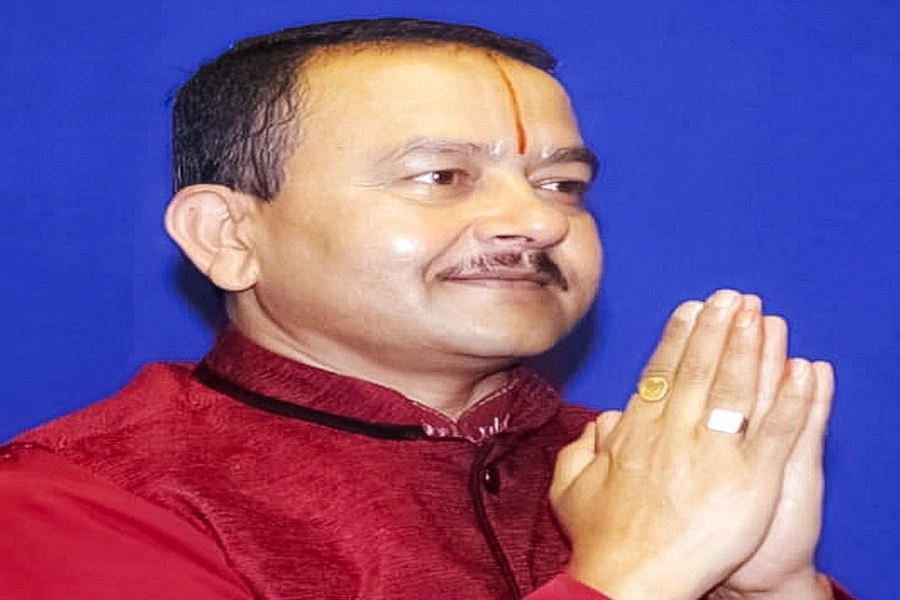Melodious tunes of a sarangi waft over a crowd gathered at the center of a street in Thamel, Kathmandu. At the heart of the crowd is Ram Krishna Gandharba, wowing the audience with his musical skills. “I’m glad no vehicles can enter this place now. Tourists can now listen to my music without straining their ears over the noises from vehicles and my business is doing great,” says Gandharba once the crowd dissipates. A few have even bought a sarangi or two from him post the performance.
Gandharba is grateful for the joint decision recently passed by the Metropolitan Traffic Police Division (MTPD) and Thamel Tourism Development Council to make a stretch of road of 120 meters from Kathmandu Guest House to Narsingh Chowk a vehicle free zone. Bikes and cars squeezing in narrow spaces was earlier creating a lot of hassles for tourists and locals who preferred to stroll and shop along the streets of Thamel.
“These lanes were made vehicle-free to promote tourism and make the place less chaotic,” says Sameer Gurung, president of Thamel Tourism Development Council, adding the ban has been imposed on all kinds of vehicles including rickshaws, bicycles, and three wheelers in this 120 meters restricted area. However, ambulances, fire brigades, vehicles used by security bodies, and transportation for diplomats are allowed to enter.
Many tourists also seemed extremely relieved by this new rule. “I think it is very relaxing. You can walk around and look at the shops without worrying about being hit by a motorbike. We visited India before coming to Nepal and it was very difficult to explore the streets and shops there because everybody was cramped on the pavements. I think banning vehicles here has made it a lot more convenient for tourists,” says Bethan King, who hails from England, UK.
Not only tourists, but Kathmandu residents too seem to applaud the decision to ban vehicles in certain streets of Thamel. “Earlier, it was very difficult to walk on these narrow lanes and I was never fond of Thamel but I’m loving this place now. It is calm, peaceful, clean and there is plenty of space to walk,” says Bima Kumari Tamang who was carelessly strolling about while waiting for a friend.
The charm of co-working spaces

Many store owners, in the vehicle-free zone, too seemed happy with the inflow of customers. According to them, Thamel has now become one of the most attractive tourist areas in Kathmandu. “Unlike the rest of the city, there is no dust and smoke in Thamel now. So tourists like coming here. And our business is flourishing,” says Sabitri Pandey, owner of a Pashmina store.
However, implementing this ban in such a short span of time was far from easy. “When this rule was newly implemented, many drivers refused to follow our orders. Some were even rebellious. Nevertheless, the situation is a lot better now,” says Ben Prasad Shrestha, sub-inspector at MTPD.
While the 120 meters long stretch in Thamel is made vehicles-free, the surrounding lanes have been made into one-way traffic zones. This hasn’t gone down too well with those who have businesses to run in these areas. “The shops that lie in the vehicle-free area are flourishing but there are very few tourists in the other areas,” says Annu Shrestha, who owns a shop in the Bhagwati Bahal lane that is a one-way street.
The decision has also resulted in flooding of vehicles in other parts of Thamel. “It is indeed a very positive step to promote tourism in Nepal. But if you notice the Bhagwati Bahal area is inundated with vehicles. There is no place for people to walk. Tourists will obviously like going to a more peaceful area in Thamel and that will hamper business is the other areas,” says Keshav Dhital, proprietor of A.K Export in Thamel.
While many shopkeepers are of the opinion that the entire area should be made onto a vehicle-free zone, others believe allowing non-motorized vehicles would be even better. However, Entrepreneurs and businessmen who are lucky enough to have their shop in the vehicle-free zone of Thamel also have their own plight to share. While some are concerned if ambulances and emergency vehicles too will have to go through various checkpoints and be delayed in case of an emergency, they all agree that currently parking is one of the biggest problems those in the vehicle-free zone are facing.
“We don’t know where to park our vehicles now. I have started coming to work in a taxi and that’s a lot of unnecessary expense,” says Pushpa Agrawal, owner of a jewelry shop that lies in the vehicle-free zone. “The local shopkeepers could be given a pass. That way we can bring our cars early in the morning and only take them out when we go home in the evening,” she adds.
When this scribe questioned the president of Thamel Tourism Development Council, Sameer Gurung, about this, he said that they were working on solving the problem. He said that the Thamel Tourism Development Council is also aware of the fact that they will have to solve numerous issues for the smooth implementation and sustainability of this rule. “The locals have been very cooperative till now and we intend to solve all their problems at the earliest,” said Gurung.
“This is our attempt to set Thamel as an example for various tourist hubs across the country. In the future, we intend also to make other tourist places of Kathmandu a vehicle free zone,” he added.
And over at New Road, Sitaram Bharati who has been working as a guard at Bishal Bazar for 22 years now says that, in all this time, he has heard Basantapur being declared a vehicle-free zone a handful of times. He forgets exactly when the last time was – five years ago maybe, he guesses – but either way he says he has stopped paying attention. “They keep bringing up this city plan and that reform bill, but they always fail to successfully implement them,” he says.
Still it’s not that he is against the idea. He wishes for Gurung’s vision to become a reality soon. “Here, unlike in Thamel, we could limit vehicle access from the New Road gate itself. He blames the consistent traffic in the area for majority of all the chaos, noise, and air pollution. He insists shopping at New Road would become a much better experience if everybody were on foot.
“It’s nice to have parts of the city where you don’t have to deal with traffic and the hassles and crowds that it brings along with it,” he says adding that he has heard wonderful things about the vehicle-free zone in Thamel.
But over at the parking lot, where Ujwol Karki considers himself incredibly lucky to have bagged a parking spot, the idea isn’t as simple as that. The areas around Basantapur are notorious for all the parking difficulties they pose. Karki, for instance, reveals that on days he has to visit the Basantapur area to carry out his chores, he dreads it from the morning itself. And though, he can see how making Basantapur completely vehicle-free would make visiting the area around a lot more better, logistics like these can’t be ignored. He points out that this was the main reason the previous bans didn’t hold up.
Karki adds, “Decisions like these impact the city plan. You have to make alterations on other areas as well, if we want to pass plans like these. The daily lives of many locals will be affected. You can see that in Thamel too.”
“At the end of the day, these are government decisions and clearly their efficiency is what matters the most here,” says Rabi Sharma, a local of New Road, adding he wasn’t very optimistic about Basantapur being made a vehicle-free zone successfully in the near future. However, he says he has noticed how the ban seems to be working in Thamel and that’s a hopeful start. “But these are still early days, let’s see how that unfolds,” he concludes.
swasti30@gmail.com






-1200x560-1772467693.webp)





























